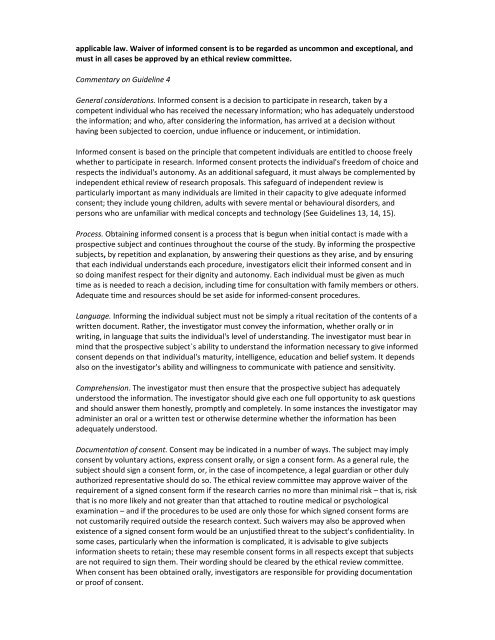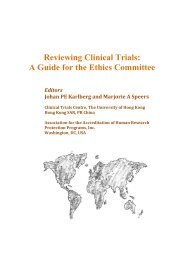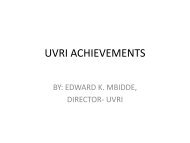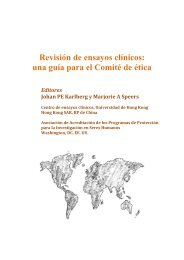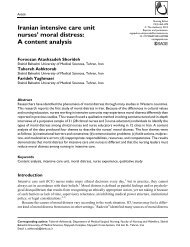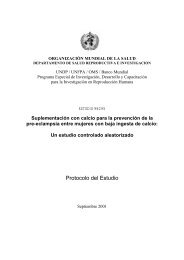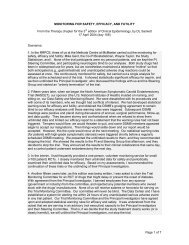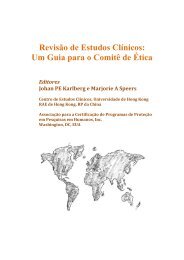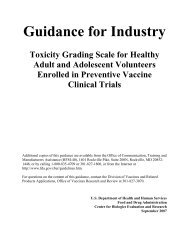CIOMS Guidelines - Global Health Trials
CIOMS Guidelines - Global Health Trials
CIOMS Guidelines - Global Health Trials
- No tags were found...
Create successful ePaper yourself
Turn your PDF publications into a flip-book with our unique Google optimized e-Paper software.
applicable law. Waiver of informed consent is to be regarded as uncommon and exceptional, andmust in all cases be approved by an ethical review committee.Commentary on Guideline 4General considerations. Informed consent is a decision to participate in research, taken by acompetent individual who has received the necessary information; who has adequately understoodthe information; and who, after considering the information, has arrived at a decision withouthaving been subjected to coercion, undue influence or inducement, or intimidation.Informed consent is based on the principle that competent individuals are entitled to choose freelywhether to participate in research. Informed consent protects the individual's freedom of choice andrespects the individual's autonomy. As an additional safeguard, it must always be complemented byindependent ethical review of research proposals. This safeguard of independent review isparticularly important as many individuals are limited in their capacity to give adequate informedconsent; they include young children, adults with severe mental or behavioural disorders, andpersons who are unfamiliar with medical concepts and technology (See <strong>Guidelines</strong> 13, 14, 15).Process. Obtaining informed consent is a process that is begun when initial contact is made with aprospective subject and continues throughout the course of the study. By informing the prospectivesubjects, by repetition and explanation, by answering their questions as they arise, and by ensuringthat each individual understands each procedure, investigators elicit their informed consent and inso doing manifest respect for their dignity and autonomy. Each individual must be given as muchtime as is needed to reach a decision, including time for consultation with family members or others.Adequate time and resources should be set aside for informed-consent procedures.Language. Informing the individual subject must not be simply a ritual recitation of the contents of awritten document. Rather, the investigator must convey the information, whether orally or inwriting, in language that suits the individual's level of understanding. The investigator must bear inmind that the prospective subject`s ability to understand the information necessary to give informedconsent depends on that individual's maturity, intelligence, education and belief system. It dependsalso on the investigator's ability and willingness to communicate with patience and sensitivity.Comprehension. The investigator must then ensure that the prospective subject has adequatelyunderstood the information. The investigator should give each one full opportunity to ask questionsand should answer them honestly, promptly and completely. In some instances the investigator mayadminister an oral or a written test or otherwise determine whether the information has beenadequately understood.Documentation of consent. Consent may be indicated in a number of ways. The subject may implyconsent by voluntary actions, express consent orally, or sign a consent form. As a general rule, thesubject should sign a consent form, or, in the case of incompetence, a legal guardian or other dulyauthorized representative should do so. The ethical review committee may approve waiver of therequirement of a signed consent form if the research carries no more than minimal risk – that is, riskthat is no more likely and not greater than that attached to routine medical or psychologicalexamination – and if the procedures to be used are only those for which signed consent forms arenot customarily required outside the research context. Such waivers may also be approved whenexistence of a signed consent form would be an unjustified threat to the subject's confidentiality. Insome cases, particularly when the information is complicated, it is advisable to give subjectsinformation sheets to retain; these may resemble consent forms in all respects except that subjectsare not required to sign them. Their wording should be cleared by the ethical review committee.When consent has been obtained orally, investigators are responsible for providing documentationor proof of consent.


